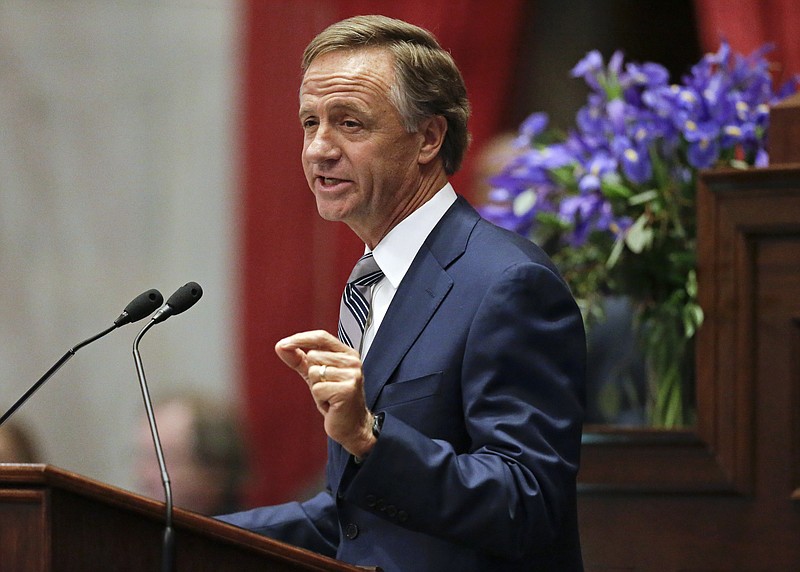NASHVILLE - Tennessee gas station and convenience store operators are fighting a provision in Gov. Bill Haslam's gas tax increase plan that would index future fuel-price hikes every two years to the rate of inflation.
In a letter sent last month to legislators, Emily LeRoy, executive director of the Tennessee Fuel and Convenience Store Association (TFCA), called the indexing provision a "blank check" for state government.
"We believe our customers will oppose an automatic tax increase, which is anti-consumer and contrary to Tennessee's reputation as a fiscally conservative state," the letter states. "We want to support this legislation, but cannot be supportive" if that's included.
LeRoy told the Times Free Press via email last week the association is not fighting Haslam's plan to hike fuel taxes by 7 cents per gallon for gasoline and 12 cents per gallon for diesel, just the indexing proposal.
The plan faces its first test Wednesday in the House Transportation Subcommittee, where at least three of the eight panel members are strongly opposed to raising fuel taxes. Competing proposals that don't include boosting gas or diesel levies are scheduled to be considered as well.
The indexing provision would tie future increases to the Consumer Price Index but impose a cap. LeRoy said the Tennessee Fuel and Convenience Store Association "cannot accept a tax increase that is based on a formula, rather than tied to expense for actual projects."
"It is our strong belief that tax increases should be publicly debated, with opportunity for voters to agree or disagree with the associated spending and that legislators should vote on every increase," she said.
Indexing "is a policy that is inconsistent with Tennessee's reputation as a state with conservative fiscal policy," she said.
The governor and his immediate family are majority owners of Pilot Flying J, a chain of travel centers across Tennessee and the U.S.
While Pilot is a member of the TFCA, a source with direct knowledge of the company's position said the Knoxville-based chain isn't involved in TFCA's fight against the indexing provision.
Efforts to contact Pilot officials Friday through the company's public relations firm were unsuccessful. Lauren Miller of Moxley Carmichael stated in an email that "the Pilot Flying J team is at a conference, and we are not able to reach them for comment."
Haslam's press secretary, Jennifer Donnals, defended the index provision, saying the governor "proposed the IMPROVE Act to build and sustain the state's economic growth and competitiveness, and indexing is an important piece to make sure we can provide a safe and reliable network for the next generation of Tennesseans."
As for Pilot, Donnals said, "We speak for the governor, not Pilot, and we look forward to Wednesday's discussion about providing Tennessee with a safe and reliable transportation network in a fiscally responsible way."
Mike Williams, executive director of the Tennessee Petroleum Council, a trade association for energy companies doing business in Tennessee, said the group would "prefer not to have indexing but that's a decision the General Assembly is going to have to make about whether they want automatic tax increases or that tax increases should be voted on one at a time."
Asked if the group is lobbying against indexing, Williams said no.
Haslam says his IMPROVE Act - it stands for Improving Manufacturing, Public Roads and Opportunities for a Vibrant Economy - is needed because revenues from the dedicated tax are stagnant as vehicles gain better mileage.
He says the state needs new money to tackle an estimated $10.5 billion backlog of interstate, highway and bridge projects in all 95 counties.
A number of states are eyeing increases this year. In 2015, Georgia increased gas and diesel taxes as part of an estimated $1 billion effort to deal with transportation.
Haslam's plan raises the gas levy from 21.4 cents per gallon to 28.4 cents and diesel from 18.4 cents to 30.4 cents. It would net the Tennessee Department of Transportation an additional $227.8 million. Cities would see some $39 million and counties another $78 million under the state's apportionment formula.
The total plan would raise $278.5 million for the state with a $5 to $20 increase in annual vehicle registration fees, a $100 annual fee for electric vehicles and a 15 cents-per-gallon tax that owners of natural gas-fueled vehicles would pay.
At the same time, Haslam is proposing tocut $270 million in taxes that support the state's general fund, which provides money to most non-highway functions of Tennessee government.
A number of the governor's fellow Republicans oppose Haslam's plan and are offering competing bills, including one that would divert a quarter percent of Tennessee's 7 percent sales tax to transportation.
On the eight-member House Transportation Subcommittee, Haslam's fuel tax proposal has at least three adamant opponents, including its chair, Rep. Terri Lynn Weaver, R-Lancaster, while it may have at least two other members opposed or uncomfortable about voting for an increase.
The proposal needs a majority to clear the panel. It's unclear whether critics will seek to amend their proposals into the governor's bill, which appears to be broad enough to allow that, or push up or down votes on their alternatives.
Contact Andy Sher at asher@timesfreepress.com or 615-255-0550. Follow on twitter at AndySher1.
